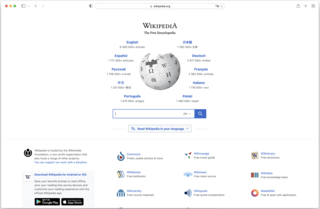
Electronic mail is a method of transmitting and receiving messages using electronic devices. It was conceived in the late–20th century as the digital version of, or counterpart to, mail. Email is a ubiquitous and very widely used communication medium; in current use, an email address is often treated as a basic and necessary part of many processes in business, commerce, government, education, entertainment, and other spheres of daily life in most countries.

The history of the Internet has its origin in the efforts of scientists and engineers to build and interconnect computer networks. The Internet Protocol Suite, the set of rules used to communicate between networks and devices on the Internet, arose from research and development in the United States and involved international collaboration, particularly with researchers in the United Kingdom and France.

The Internet is the global system of interconnected computer networks that uses the Internet protocol suite (TCP/IP) to communicate between networks and devices. It is a network of networks that consists of private, public, academic, business, and government networks of local to global scope, linked by a broad array of electronic, wireless, and optical networking technologies. The Internet carries a vast range of information resources and services, such as the interlinked hypertext documents and applications of the World Wide Web (WWW), electronic mail, telephony, and file sharing.

Internet Explorer is a retired series of graphical web browsers developed by Microsoft that were used in the Windows line of operating systems. While IE has been discontinued on most Windows editions, it remains supported on certain editions of Windows, such as Windows 10 LTSB/LTSC. Starting in 1995, it was first released as part of the add-on package Plus! for Windows 95 that year. Later versions were available as free downloads or in-service packs and included in the original equipment manufacturer (OEM) service releases of Windows 95 and later versions of Windows. Microsoft spent over US$100 million per year on Internet Explorer in the late 1990s, with over 1,000 people involved in the project by 1999. New feature development for the browser was discontinued in 2016 and ended support on June 15, 2022 for Windows 10 Semi-Annual Channel (SAC), in favor of its successor, Microsoft Edge.
The Internet protocol suite, commonly known as TCP/IP, is a framework for organizing the set of communication protocols used in the Internet and similar computer networks according to functional criteria. The foundational protocols in the suite are the Transmission Control Protocol (TCP), the User Datagram Protocol (UDP), and the Internet Protocol (IP). Early versions of this networking model were known as the Department of Defense (DoD) model because the research and development were funded by the United States Department of Defense through DARPA.

Mass media includes the diverse arrays of media that reach a large audience via mass communication.

The World Wide Web is an information system that enables content sharing over the Internet through user-friendly ways meant to appeal to users beyond IT specialists and hobbyists. It allows documents and other web resources to be accessed over the Internet according to specific rules of the Hypertext Transfer Protocol (HTTP).

A web browser is an application for accessing websites and the Internet. When a user requests a web page from a particular website, the browser retrieves its files from a web server and then displays the page on the user's screen. Browsers are used on a range of devices, including desktops, laptops, tablets, and smartphones. In 2020, an estimated 4.9 billion people have used a browser. The most used browser is Google Chrome, with a 65% global market share on all devices, followed by Safari with 18%.

A website is a collection of web pages and related content that is identified by a common domain name and published on at least one web server. Websites are typically dedicated to a particular topic or purpose, such as news, education, commerce, entertainment or social networking. Hyperlinking between web pages guides the navigation of the site, which often starts with a home page. As of May 2023, the top 5 most visited websites are Google Search, YouTube, Facebook, Twitter, and Instagram.

An Internet service provider (ISP) is an organization that provides services for accessing, using, managing, or participating in the Internet. ISPs can be organized in various forms, such as commercial, community-owned, non-profit, or otherwise privately owned.

The Internet Archive is an American digital library founded on May 10, 1996, and chaired by free information advocate Brewster Kahle. It provides free access to collections of digitized materials including websites, software applications, music, audiovisual and print materials. The Archive also advocates for a free and open Internet. As of January 1, 2023, the Internet Archive says that it holds more than 38 million print materials, 11.6 million pieces of audiovisual content, 2.6 million software programs, 15 million audio files, 4.7 million images, 251,000 concerts, and over 832 billion web pages in its Wayback Machine. Their mission is to provide "universal access to all knowledge."

The Advanced Research Projects Agency Network (ARPANET) was the first wide-area packet-switched network with distributed control and one of the first computer networks to implement the TCP/IP protocol suite. Both technologies became the technical foundation of the Internet. The ARPANET was established by the Advanced Research Projects Agency (ARPA) of the United States Department of Defense.

The Internet Broadway Database (IBDB) is an online database of Broadway theatre productions and their personnel. It was conceived and created by Karen Hauser in 1996 and is operated by the Research Department of The Broadway League, a trade association for the North American commercial theatre community.
The CYCLADES computer network was a French research network created in the early 1970s. It was one of the pioneering networks experimenting with the concept of packet switching and, unlike the ARPANET, was explicitly designed to facilitate internetworking.

The IWGP Heavyweight Championship was a professional wrestling world heavyweight championship owned by the New Japan Pro-Wrestling (NJPW) promotion. "IWGP" is the acronym of NJPW's governing body, the International Wrestling Grand Prix. The title was introduced on June 12, 1987, in the final of an IWGP tournament. It was unified with the IWGP Intercontinental Championship on March 4, 2021 to form the new IWGP World Heavyweight Championship.

A computer network is a set of computers sharing resources located on or provided by network nodes. Computers use common communication protocols over digital interconnections to communicate with each other. These interconnections are made up of telecommunication network technologies based on physically wired, optical, and wireless radio-frequency methods that may be arranged in a variety of network topologies.

A viral video is a video that becomes popular through a viral process of Internet sharing, typically through video sharing websites such as YouTube as well as social media and email. For a video to be shareable or spreadable, it must focus on the social logics and cultural practices that have enabled and popularized these new platforms.

The Wayback Machine is a digital archive of the World Wide Web founded by the Internet Archive, a nonprofit based in San Francisco, California. Created in 1996 and launched to the public in 2001, it allows the user to go "back in time" to see how websites looked in the past. Its founders, Brewster Kahle and Bruce Gilliat, developed the Wayback Machine to provide "universal access to all knowledge" by preserving archived copies of defunct web pages.















